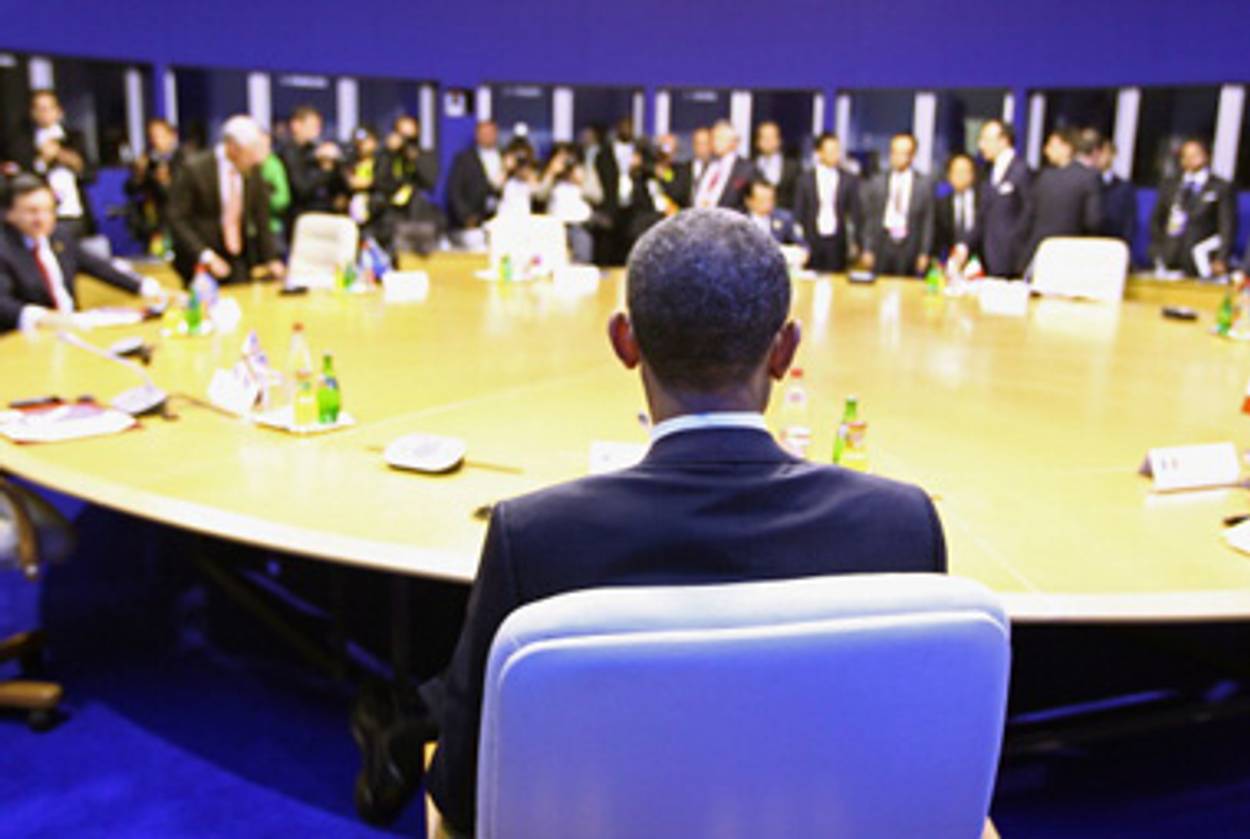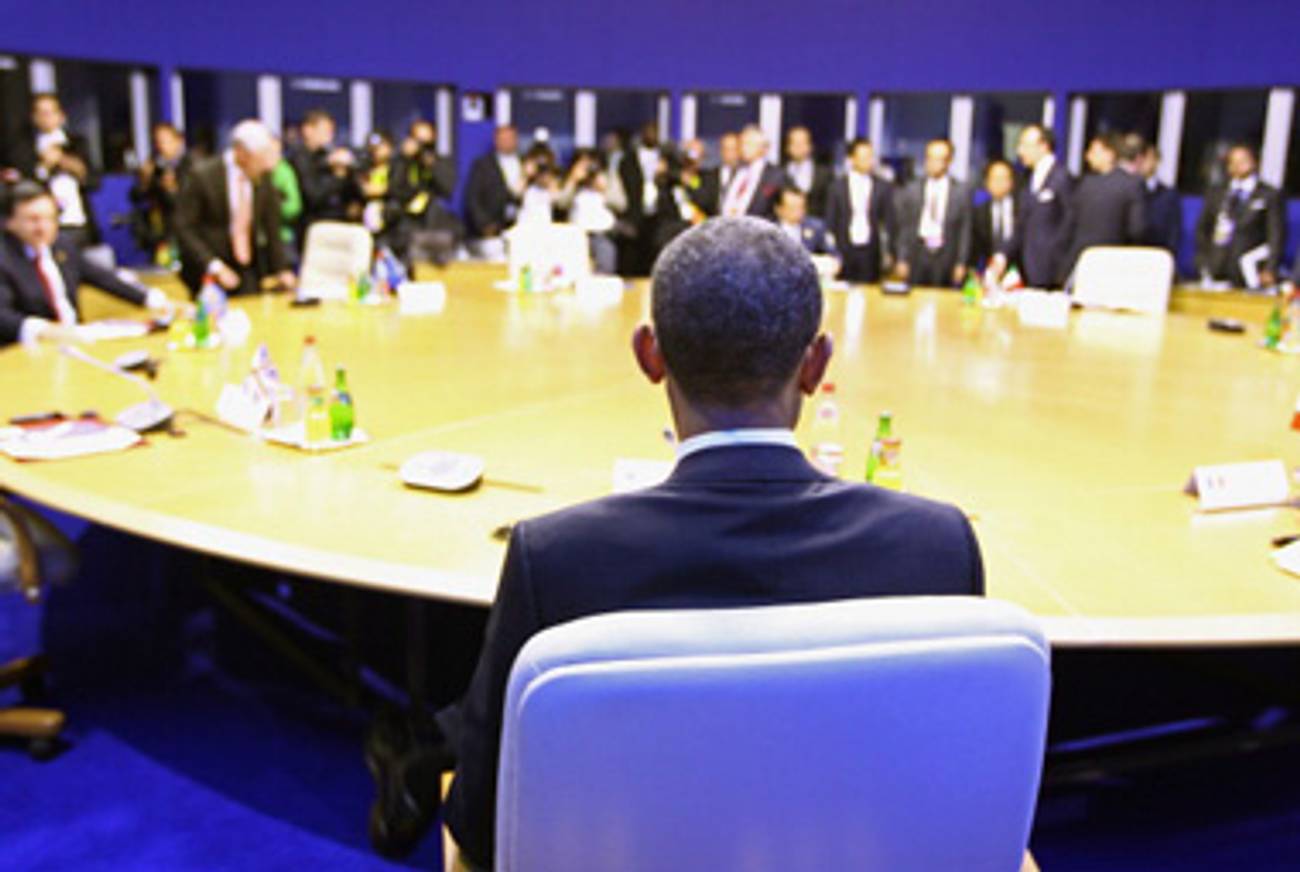Will Israel-Based GOP Attacks Get Through?
Speech, designed to help Israel with Europe, could hurt Obama at home




Earlier this week, I argued that some Republicans’ attempts to turn President Obama’s Israel diplomacy—specifically, the objectively false narrative that he requested a return to the 1967 borders and the polemical accusation that he sold Israel out—into a partisan wedge issue against Obama and other Democrats would prove futile and short-lived. I argued that the anti-Obama argument was unconvincing since he took the pro-Israel positions on Iran, on Hamas, and, most importantly, on the United Nations; that Democrats, which routinely win overwhelming majorities of Jewish support and have many, many more powerful Jewish politicians than the Republicans, are in a structurally secure place in terms of the Jewish vote; and that many of Israel’s strongest supporters (to say nothing of Prime Minister Netanyahu) do not want Israel to become a partisan issue—they would prefer U.S. support for Israel to be as unquestioned, and therefore as bipartisan, as possible.
All of those premises remain true. In fact, it seems increasingly clear that Obama made his 1967 “concession” precisely in order to convince Europe to oppose Palestinian statehood at the United Nations—that is, to try to help Israel. Yet when it comes to Jewish voters and especially to Jewish donors, I think I was somewhat mistaken. I think we will hear Republicans “singing from the mountaintops for the next 17 months,” as the Republican Party head Reince Priebus classily put it, about some Democrats’ wavering on Israel, including Obama. And while some of this will be well-intentioned, early indications are that much of it won’t be (I’m thinking of the Republican congressman who lectured, “too many American Jews aren’t as pro-Israel as they should be”).
In terms of voters, it is useful to define victory downward, realistically. “Republicans do not suggest that they can soon break the Democratic Party’s long hold on the loyalty of Jewish-American voters,” the New York Times reported yesterday. Rather, they aim “to diminish the millions of dollars, volunteer activism and ultimately the votes that Mr. Obama and his party typically get from American Jews—support that is disproportionate to their numbers,” in part because of their concentration in swing states.
Speaking of Florida! The microcosmic battle right now is between Rep. Debbie Wasserman Schultz, who is head of the Democratic National Committee, and Matthew Brooks, executive director of the Republican Jewish Coalition. The two feuded in front of Bibi earlier in the week, after which Schultz asked Brooks to agree that Republicans would not introduce Israel as a political issue in the 2012 campaign. His refusal is a fascinating combination of honesty—he praises Schultz’s personal voting record, and condemns members of his own party, like Ron Paul, who do not sufficiently support the Jewish State—and near-Orwellian spin, to wit: “In order to maintain bipartisan support for Israel, the RJC will continue to publicly point out the records and statements of public officials who stray from this bipartisan position.” Essentially, Shultz asked for a truce and was told to come back heavy (and she has, going on the offensive and arguing Obama has nothing to fear).
Much more risible, of course, are the politicians—of both parties—who have blatantly (and one can only assume deliberately, unless they are stupid) misrepresented Obama’s views. Rep. Robert Andrews, a Democrat from New Jersey, accused Obama of “tilting toward Hamas” (last Thursday, Obama said, “Palestinian leaders will not achieve peace or prosperity if Hamas insists on a path of terror and rejection”). Tea Party favorite and possible Republican presidential candidate Rep. Michelle Bachmann released an ad stating, “President Obama today announced his support of returning Israel and Palestine to the pre war borders of 1967” (which is a lie: “The borders of Israel and Palestine should be based on the 1967 lines with mutually agreed swaps,” Obama said).
And then, of course, there was Rep. Joe Walsh, Republican of Illinois, telling the Jews that he knows what’s best for them, as some Catholics have for millennia.
So, votes? I think enough American Jews are smart enough to see through this—and I also think a lot of the voters whose most important issue is Israel are not Jews—that Obama need not lose sleep over the nearly four-fifths of Jewish voters he won in 2008.
Money-wise, though? There have been a number of reports (here’s a typical one; here’s another) of once-friendly Jewish donors getting cold feet over Obama’s latest moves. One thing these reports have in common is none name actual Obama supporters who have actually decided no longer to support him because of this; the oft-cited Democratic funder Haim Saban actually never liked Obama. And it was with the donors that I predicted last Friday Obama may have issues. Apparently the date to circle on your calendar concerning this issue is June 20, when Obama will meet about 80 donors for a dinner that will be private until after it’s over and the donors’ dissatisfaction is leaked. Til then, don’t let the bastards get you down.
Parties See Obama’s Israel Policy as Wedge for 2012 [NYT]
GOP Jews Are Clear: Israel Is An Election Issue [FrumForum]
DNC Chair Argues Obama Is Not Losing Support of Jewish Voters [LAT]
President Obama Is Not Israel’s Friend [The Daily Caller]
The Growth and Success of Post-Jewish Zionism in America [Matthew Yglesias]
Obama’s Jewish Backers On Edge Over His Mideast Peace Plan [LAT]
Obama’s Speech Doesn’t Sway Some Key Donors [Washington Times]
Haim Saban Can’t ‘Break’ What He Never Forged [Capital J]
F.A.Q.: Did Obama Say Anything for Israel to Get Excited About? [Capital]
Earlier: Why Israel Makes For a Lousy Partisan Issue
Bibi Gets What He Wants, Replies With Scorn
In Diplomatic Theater, Is Europe the Audience?
Marc Tracy is a staff writer at The New Republic, and was previously a staff writer at Tablet. He tweets @marcatracy.